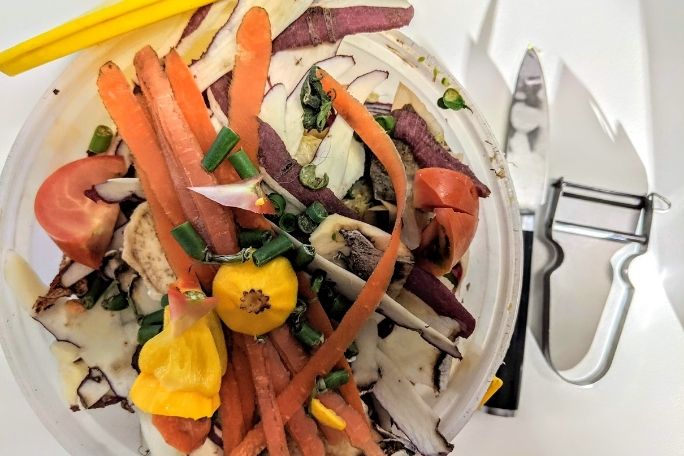Lesson summary
Students investigate the types and quantities of organic waste produced by the school, how the school deals with this waste and how well it is dealing with this waste.
Learning intentions:
Students will...
- learn that organic waste is made up of food scraps and garden waste.
- understand that instead of placing it in bins or skips that will be emptied in a landfill, there are several alternative ways of disposing of this organic waste: 1. Onsite methods such as composted, worm composted, fed to chickens, chipped and used as mulch; and 2. Removed from the school for treatment elsewhere, such as council composting facility.
- learn that organic waste can make up as much as half total waste produced by a school, so by disposing of it correctly, by composting, mulching or feeding it to chickens, a school can halve its waste to landfill.
Lesson guides and printables
Lesson details
Curriculum mapping
Australian curriculum content description:
Year 5 Science:
- Living things have structural features and adaptations that help them to survive in their environment (ACSSU043)
- Scientific knowledge is used to inform personal and community decisions (ACSHE083)
- With guidance, pose questions to clarify practical problems or inform a scientific investigation, and predict what the findings of an investigation might be (ACSIS231)
- Identify, plan and apply the elements of scientific investigations to answer questions and solve problems using equipment and materials safely and identifying potential risks (ACSIS086)
Year 6 Science:
- The growth and survival of living things are affected by the physical conditions of their environment (ACSSU094)
- Scientific knowledge is used to inform personal and community decisions (ACSHE100)
- With guidance, pose questions to clarify practical problems or inform a scientific investigation, and predict what the findings of an investigation might be (ACSIS232)
- Identify, plan and apply the elements of scientific investigations to answer questions and solve problems using equipment and materials safely and identifying potential risks (ACSIS103)
Syllabus Outcomes: ST3-6PW, ST3-4WS, ST3-10LW, ST3-11LW.
Time required: several 48 min sessions.
Level of teacher scaffolding: High – facilitate the activities, supervise outdoor investigations.
Additional info
This is an original Cool.org lesson. Facts and figures in these lessons may have changed since this lesson was published. We always endeavour to update our resources in a timely manner, but if you see an error or issue in our resources please get in touch with us.


Welcome back!
Don't have an account yet?
Log in with:
By signing up to Cool.org you consent and agree to Cool's privacy policy to
store, manage and process your personal information. To read more, please see
our privacy policy here(Opens in new tab).
Create your free Cool.org account.
Many of our resources are free, with an option to upgrade to Cool+ for premium content.
Already have an account?
Sign up with:
By signing up to Cool.org you consent and agree to Cool's privacy policy to
store, manage and process your personal information. To read more, please see
our privacy policy here(Opens in new tab).